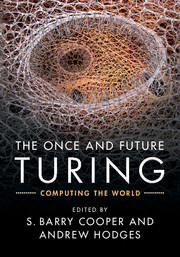Book contents
- Frontmatter
- Contents
- Contributors
- Preface
- Introduction
- Part One Inside Our Computable World, and the Mathematics of Universality
- Part Two The Computation of Processes, and Not Computing the Brain
- Part Three The Reverse Engineering Road to Computing Life
- Part Four Biology, Mind, and the Outer Reaches of Quantum Computation
- 11 Answering Descartes: Beyond Turing
- 12 The Ghost in the Quantum Turing Machine
- Part Five Oracles, Infinitary Computation, and the Physics of the Mind
- Afterword
- References
12 - The Ghost in the Quantum Turing Machine
from Part Four - Biology, Mind, and the Outer Reaches of Quantum Computation
Published online by Cambridge University Press: 05 March 2016
- Frontmatter
- Contents
- Contributors
- Preface
- Introduction
- Part One Inside Our Computable World, and the Mathematics of Universality
- Part Two The Computation of Processes, and Not Computing the Brain
- Part Three The Reverse Engineering Road to Computing Life
- Part Four Biology, Mind, and the Outer Reaches of Quantum Computation
- 11 Answering Descartes: Beyond Turing
- 12 The Ghost in the Quantum Turing Machine
- Part Five Oracles, Infinitary Computation, and the Physics of the Mind
- Afterword
- References
Summary
Abstract
In honor of Alan Turing's hundredth birthday, I unwisely set out some thoughts about one of Turing's obsessions throughout his life, the question of physics and free will. I focus relatively narrowly on a notion that I call ‘Knightian freedom’: a certain kind of in-principle physical unpredictability that goes beyond probabilistic unpredictability. Other, more metaphysical, aspects of free will I regard as possibly outside the scope of science.
I examine a viewpoint, suggested independently by Carl Hoefer, Cristi Stoica, and even Turing himself, that tries to find scope for ‘freedom’ in the universe's boundary conditions rather than in the dynamical laws. Taking this viewpoint seriously leads to many interesting conceptual problems. I investigate how far one can go toward solving those problems and, along the way, I encounter (among other things) the no-cloning theorem, the measurement problem, decoherence, chaos, the arrow of time, the holographic principle, Newcomb's paradox, Boltzmann brains, algorithmic information theory, and the common prior assumption. I also compare the viewpoint explored here with the more radical speculations of Roger Penrose.
The result of all this is an unusual perspective on time, quantum mechanics, and causation, of which I myself remain skeptical but which has several appealing features. Among other things, it suggests interesting empirical questions in neuro-science, physics, and cosmology; and it takes a millennia-old philosophical debate into some underexplored territory.
When I was a teenager, Alan Turing was at the top of my pantheon of scientific heroes, above even Darwin, Ramanujan, Einstein, and Feynman. Some of the reasons were obvious: the founding of computer science, the proof of the unsolvability of the Entscheidungsproblem, the breaking of the Nazi Enigma code, the unapologetic nerdiness and the near-martyrdom for human rights. But beyond the facts of his biography, I idolized Turing as an ‘ über-reductionist’: the scientist who had gone further than anyone before him to reveal the mechanistic nature of reality. Through his discovery of computational universality, as well as the Turing Test criterion for intelligence, Turing finally unmasked the pretensions of anyone who claimed there was anything more to mind, brain, or the physical world than the unfolding of an immense computation.
- Type
- Chapter
- Information
- The Once and Future TuringComputing the World, pp. 193 - 296Publisher: Cambridge University PressPrint publication year: 2016
References
- 13
- Cited by

